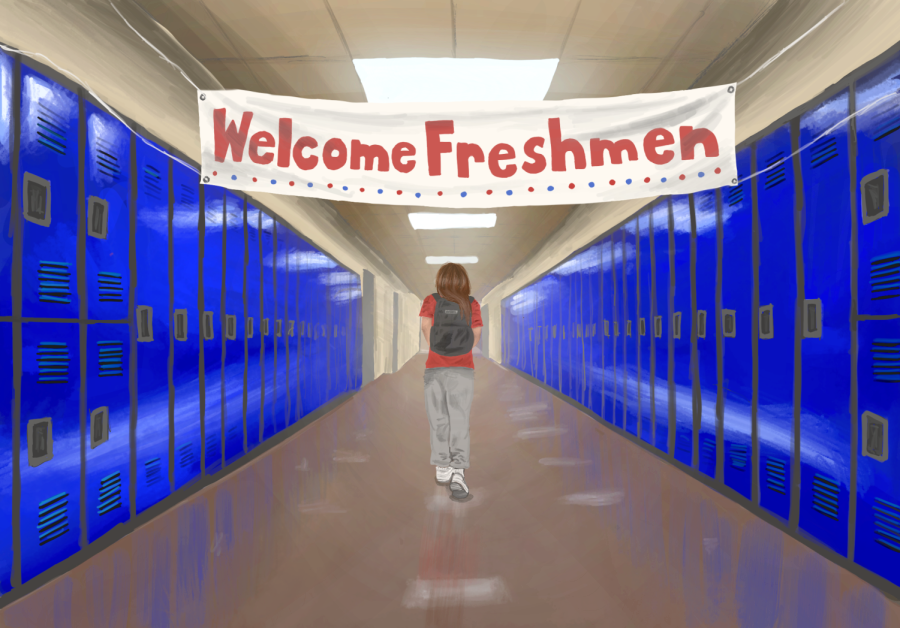The First-Year Experience: A Look Inside the Freshman Mind
Campolindo freshman walks through the hallway.
Whether it’s through social media, or referenced in popular TV shows and movies, it seems as though the stigma and stereotypes surrounding freshmen have continued to decline. The media has imprinted the idea that a normal day as a freshman includes being aggressively shoved into lockers and eating lunch in the bathroom.
Although these situations rarely occur, it’s safe to say that high school itself involves many obstacles for freshmen that upperclassmen might not be able to pick up on as we roam the halls. Things that go beyond just the physical extent, and are what we deal with internally as well.
1 major obstacle that freshman students deal with is the arguably most chaotic and stress-inducing part of the school: the hallways. Dodging judgemental looks and clusters of students all pose obstacles in the way of getting to class on time. Navigating such a large campus with so many classrooms is difficult for any experienced student, let alone a student who has just begun to figure out the layout of campus.
When walking down the hallway, we constantly feel the burning stares of upperclassmen surrounding us. When we should be focused on getting to the right classroom, the question of what the sophomores, juniors and seniors think of us focuses our mind.
“Am I walking too slow? Which side of the hallway do I even walk on? Do I look like a loser walking alone?”
Not to mention the struggle of lunch. With so many people on campus, and very large common areas, the issue of figuring out where to eat lunch presents itself. And hallways that are reserved for certain grades, (i.e. the senior deck) definitely don’t contribute to a very welcoming scene at lunch. Sitting on the ground seems almost like a punishment for freshmen. All the benches and tables are filled up by the upperclassmen, so while getting your new jeans dirty on the ground of the pavement isn’t ideal, it feels there isn’t any other option than to deal with it.
“Where do I sit? Did I steal someone’s spot?”
Finally, the 1 part of school that should feel normal: class. Instead of being a familiar, comfortable place, all of a sudden your grades determine your future. 1 B feels like the end of the world and failing a test is no longer something to laugh about with your friends. Assignments that were once mindlessly completed now feel like the ultimate deciding factor of going to college. The words GPA are constantly in the back of your head. Checking your grades on Canvas is now an hourly ritual you feel you can’t stop. And in class, when the teacher is calling on students, you no longer brush it off when you get the answer wrong. With each new concept, you obsess and obsess some more, wondering how much harder it is going to get from here on out.
“Am I dumb for not understanding the material? Is this 1 test going to dictate my entire future?”
Something that all high school students get the opportunity to participate in is Spirit Weeks: 1 week every few months in which teens of all grades get the chance to dress up according to the respective themes. But what should be a week of fun, and enjoyment can quickly become a week of shame for the freshman students. Upperclassmen constantly stress to us that we need to participate and dress up every day, but as soon as you show up to school in a full costume you immediately feel judged for trying too hard to be like them. It seems like school spirit has somehow become exclusive to upperclassmen: as if the number of years we have been at the school completely dictates how much we can represent it, and feel a part of the community. But not risking the embarrassment and skipping out on dress up days doesn’t have a positive outcome either. A casual outfit on spirit days will earn a freshman disappointing looks from the upperclassmen, who constantly torment them for their lack of school spirit. It seems like whether we go all out and decide to be bold with our outfits, versus when we decide to go more low-key, we can never be accepted, or praised during Spirit Weeks. Is my outfit over the top?
“Am I dressing up enough? Is going all out for Spirit Week only reserved for the seniors?”
The recurring phrase we always hear: “It’s only going to get harder from here.” With these words in mind, the pressure of high school weighing on freshman students doesn’t just disappear when we leave the school campus. Parents, teachers, and friends constantly tell us that we should be involved in school sports or any after school activities to keep our focus from solely being on school, but with these activities on top of homework, there seems to be no time left to relax.
We look forward to the free time granted by days of the week in which we have a more reasonable amount of extracurricular activities. But those hours are quickly eaten away by homework, and studying. It sometimes seems like teachers fail to realize that just because we are on the younger end of the spectrum at school, we still have lives outside of the 7 hours we are on campus. An hour of homework per class adds up and the constant stress of our grades overtakes any of our activities outside of school.
“Am I going to finish all of my homework? Does anybody else feel as stressed as I am? How do I even decide on my priorities when the schoolwork decides it for me?”
Furthermore, the lack of encouragement and reassurance from upperclassmen certainly doesn’t help. In nearly any conversation we have had with upperclassmen, it seems as though we aren’t allowed to be happy with our freshman-year successes. With any expression of pride for our grades, or test scores, we are constantly reminded of the difficult school work to come. While they may think they are doing us a service by “preparing” us for the future, constantly bringing up the heavy workload to come actually just paints a dark cloud over our high school experience, and presents more worries. It’s hard to feel like we have the right to be proud of our accomplishments when our struggles and successes are constantly diminished by those older than us. The fact that we are earlier on in our high school career doesn’t mean we can’t be stressed out about our schoolwork, or proud when we are excelling in it.
“Do you really think that your grades are going to be that good next year? How am I going to handle all of the schoolwork next year?”
Not only do we face pestering by upperclassmen for how we express our feelings about our school work, we also face taunting from fellow freshmen for the way in which we navigate our social lives. With the advancement into high school comes more socializing, and therefore more parties. For many students, the larger social scene also comes with a pressure to place outside of school mingling above success in school. The fear of missing out on these parties, (also known as FOMO) is present in many student’s minds. Before turning down a get-together in order to study for that next test, or finish those missing assignments, the threat of seeming antisocial comes into light. We fear the judgement of our peers for prioritizing our grades over a couple of parties so much that we feel guilty when we even consider not attending a social event to do schoolwork.
“Are you really missing a party to study? Am I lame for caring about my grades? What will my friends think when they find out I stayed home?”
Along with the increased presence of social events, sports are also a key component of the school itself. Most students on campus participate in 1 or more sports at Campolindo; they walk the halls with their team merchandise representing the sport they play. While those who participate in these activities clearly feel a sense of belonging because of it, it is easy to see how those outside of these athletic groups tend to feel as if they are missing out on the experience. It seems as though sports teams have become an exclusive club. Especially with the popularity of football, basketball, and water polo games, it often feels like those who participate in an activity outside of Campo are left in the dust. We understand that it is encouraged to join sports teams at Campo, especially as a freshman. However, people need to realize that just because we don’t participate in sports through school doesn’t mean that we aren’t a part of a group outside of school, or that we don’t have something we are passionate about. Having to tell someone, “Oh, actually I do dance outside of school,” often brings upon judgement from both upperclassmen and fellow freshmen. It is important to remember that just because someone isn’t involved in the same sport as you does not mean that they should be left out of a group, or treated like an outsider. Everyday, freshmen have to deal with the harsh reality that one’s status at the school seems to revolve around their participation in school sports.
“Do I need to participate in a school sport? Will I be left out forever if I don’t join a sports team?”
Throughout elementary and middle school, many of us build strong bonds with our peers. But something that is often glossed over is how difficult maintaining these friendships in high school can be. Difficult classes and new social circles can lead to feeling distant from those we were once close to. Isolation is a common feeling among students, especially freshmen who are mostly focused on maintaining their academic status. New friendships come along as freshmen step into new classrooms that are no longer filled with their middle school friends. These new friendships challenge existing ones that are no longer as solid as they once were. Worrying about the bonds your former friends are making is a natural reaction to the large numbers of people that share the campus. We pass by our former companions in the halls, possibly flashing a quick smile, but the interaction quickly fades away into a pool of rushing students getting to their next class. Old and new friendships will be tested throughout the years of high school, which is clear by observing upperclassmen who once went to your middle school ignoring those whom they were close to during their time there. Navigating relationships heavily contributes to a freshman’s feeling of comfort on campus.
“Is my friend ignoring me? What will my friends think if I hang out with a different group?”
With so many external obstacles encountered by freshmen, it can be hard for a new student to maintain their internal wellbeing. Both mental and physical health can become heavily weakened by schoolwork, social events, and just the nature of high school in general. For example, maintaining a healthy sleep schedule is a struggle in itself. With night hours eaten away by schoolwork and extracurriculars, and early start times, fitting in enough rest becomes harder. We often begin to prioritize turning in that 1 missing assignment over getting enough rest for the day ahead. Teachers often advise us to get a good rest the night before a test, but seemingly forget that we don’t always have the option to get to bed early with all of our work from other classes. Beyond the physical exhaustion that comes with freshman year, a great deal of mental exhaustion is dealt with as well. The constant repetitive cycle of a 7 hour school day, followed by extracurriculars, and homework often leads to a sense of burnout. A sudden overload of assignments that freshmen are not used to make them feel like they have no leftover time to focus on their own personal struggles outside of school, and that they must put their schoolwork over their wellbeing in order to succeed. The stress of all these assignments builds up overtime to eventually make students feel no sense of motivation to complete them. Learning to balance both schoolwork with personal wellbeing is a skill that certainly comes with time and practice, so for freshmen, it can seem like an impossible task.
“Is this amount of stress normal? Why do my friends seem like they have way less to do than me?”
While we could go on and on about the struggles students face in their freshman year, the harsh reality is that these struggles won’t really go away. However, while it isn’t possible to change the entire culture of high school, and the experiences that come along with it, 1 thing we can change is the way we support the lowerclassmen. Rather than using their experience to make things harder for freshmen, perhaps upperclassmen can work towards being more of a mentor figure. After all, all 4 grades share the school, and all 4 grades should feel supported at the place that sets up their future.
Your donation will support the student journalists of Campolindo High School's The Claw. Your contribution will allow us to produce more issues and cover our annual website hosting costs.

Freshman Mia Daly’s passion for freedom in prose drove her to join the writing staff for The Claw.
Daly has always loved writing and English classes....

Freshman Ruthie Stoll is a dancer, tennis player, and foodie. She grew up in a small town in Pennsylvania, moved to the Bay when she was 4, and just graduated...

Alex Gonzales is a senior and a 1st year journalism student on the Art Staff. Gonzales grew up in Montclair before moving to Lafayette. “I joined journalism...


